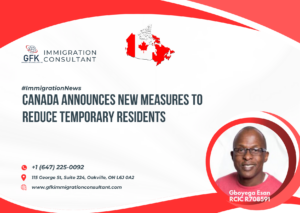Canada announces new measures to reduce temporary residents.

In response to the evolving needs of the Canadian immigration system, the Honourable Marc Miller, Minister of Immigration, Refugees, and Citizenship Canada, unveiled significant new measures aimed at managing the influx of temporary residents, particularly international students and foreign workers.
These measures come as part of a broader strategy to address labour shortages, safeguard the asylum system, and ensure that temporary residents are adequately supported throughout their stay in Canada.
Table of Contents
1. Reduction in Study Permits for 2025
2. Updates to the Post-Graduation Work Permit (PGWP) Program
3. Changes to Work Permit Eligibility for Spouses of Foreign Students and Workers
Addressing the Growing Volume of Asylum Claims
A Broader Immigration Plan for Sustainable Growth
Budget 2024: Funding to Support the Asylum System
What the Future Holds
I consent to receiving emails and personalized ads.
Key Measures in the Announcement
The latest measures, which include changes to international student study permits and work permit eligibility, reflect Canada’s growing challenges in accommodating temporary residents.
The steps outlined by Minister Miller and the Honourable Randy Boissonnault, Minister of Employment, Workforce Development, and Official Languages, aim to ensure the sustainability of immigration programs and prioritize Canadian workers.
1. Reduction in Study Permits for 2025
One of the most notable changes is the reduction in the intake cap for international student study permits starting in 2025.
The government has announced a 10% reduction from the 2024 target of 485,000 study permits, which will bring the number of permits issued in 2025 to 437,000.
This reduction is a direct response to concerns about the growing number of international students in Canada and its potential strain on housing and public resources.
The intake cap for 2026 will remain at the 2025 level, stabilizing the number of new study permits issued.
This reduction is intended to ensure that international students can be adequately supported while they pursue education and future employment opportunities in Canada.
2. Updates to the Post-Graduation Work Permit (PGWP) Program
Another significant change is the update to the Post-Graduation Work Permit (PGWP) Program, which allows international students to work in Canada after completing their studies.
Starting in November 2024, new language proficiency requirements will be introduced for PGWP applicants. University graduates will need to meet a Canadian Language Benchmark (CLB) level of 7, while college graduates will need a CLB level of 5.
These requirements aim to improve international graduates’ ability to integrate into Canada’s workforce and transition to permanent residency.
Additionally, only graduates from fields of study linked to occupations in long-term shortage will be eligible for a PGWP of up to three years. This aligns the program more closely with Canada’s labour market needs and immigration goals.
3. Changes to Work Permit Eligibility for Spouses of Foreign Students and Workers
To further manage the number of temporary residents, the Canadian government is introducing restrictions on work permits for spouses of international students and foreign workers.
Later this year, only the spouses of master’s degree students in programs lasting at least 16 months will be eligible for work permits.
Additionally, the Temporary Foreign Worker Program (TFWP) and International Mobility Program (IMP) will only issue work permits to the spouses of foreign workers in management or professional occupations or in industries where there is a labour shortage.
These changes are designed to prioritize Canadian workers while ensuring that the foreign workers who do come to Canada fill essential roles in sectors that are struggling with shortages.
Addressing the Growing Volume of Asylum Claims
In addition to managing the volume of international students and foreign workers, the Canadian government is also focusing on improving the asylum system.
The increase in displaced people worldwide has led to a growing number of asylum claims in Canada, placing further strain on the country’s immigration and temporary resident systems.
To address these challenges, the government has implemented several measures aimed at strengthening visa integrity and improving the asylum process:
Partial visa requirements for Mexican nationals: This change is intended to manage the volume of non-genuine visitors and maintain control over temporary resident admissions.
Improved claims processing: In 2024, the government announced measures to enhance the processing of asylum claims while preserving the fairness and integrity of the system. These updates aim to make the process more efficient without compromising the thoroughness of assessments.
Review of visa decision-making: The government will review visa decision-making protocols to equip immigration officers with better tools to detect fraud and reduce the number of non-genuine visa applications.
By strengthening the asylum system, the government aims to ensure that Canada remains committed to its humanitarian responsibilities while maintaining control over the volume of temporary residents.
A Broader Immigration Plan for Sustainable Growth
The Canadian government’s latest measures to manage temporary residents are part of a larger, comprehensive immigration plan.
Minister Miller emphasized that while Canada is committed to welcoming newcomers, it is essential to maintain the integrity and sustainability of the immigration system.
“The reality is that not everyone who wants to come to Canada will be able to—just like not everyone who wants to stay in Canada will be able to,” said Minister Miller.
“We are taking action to strengthen our temporary residence programs and roll out a more comprehensive immigration plan to meet the demands of today’s changing landscape.”
Minister Boissonnault echoed this sentiment, noting that the Temporary Foreign Worker Program (TFWP) was designed to address labour shortages when qualified Canadians were not available.
However, with more Canadians now able to fill these roles, the government is prioritizing Canadian workers by limiting the availability of work permits to foreign workers in sectors where there are genuine shortages.
The government will also introduce further measures to protect vulnerable individuals and uphold the integrity of immigration programs.
These measures include preventing the exploitation of international students and foreign workers and ensuring that only those who meet the necessary qualifications are granted temporary status in Canada.
Budget 2024: Funding to Support the Asylum System
As part of the government’s ongoing efforts to strengthen Canada’s immigration and asylum systems, Budget 2024 proposes $743.5 million over five years, starting in 2024–2025, with an additional $159.5 million ongoing.
This funding is aimed at enhancing the stability and integrity of the asylum system, ensuring that Canada can continue to uphold its humanitarian commitments while maintaining control over its borders.
What the Future Holds
The reduction in temporary residents to 5% of Canada’s total population by 2027, as outlined in the forthcoming 2025–2027 Immigration Levels Plan, is a clear signal of the government’s intent to carefully manage immigration volumes.
The plan, set to be released by November 1, 2024, will reflect the new intake caps for international students and other temporary residents.
Graduates of public college programs and master’s and doctoral students who meet the updated eligibility criteria will continue to play a crucial role in Canada’s labour market.
To ensure the success of these individuals, the government will reserve 12% of study permit spaces for these students as part of the new intake caps.
These changes mark a new chapter in Canada’s approach to immigration, with a focus on balancing the needs of the economy with the well-being of temporary residents.
As the government continues to adapt to the changing immigration landscape, these measures will help ensure that Canada remains a destination of choice for international students, skilled workers, and those seeking asylum.
Conclusion
The changes announced by the Canadian government, particularly the reduction in international student study permits and new restrictions on work permit eligibility, highlight the need for a sustainable immigration system that aligns with the country’s economic goals.
While Canada remains committed to welcoming newcomers, these measures aim to ensure that the system operates with integrity and efficiency.
GFK Immigration
Gboyega Esan RCIC R708591
Phone: +1 (647) 225-0092
#immigration #immigrationnews #news #blognews #canada #Pr #FamilySponsorship #GFKImmigration #ReuniteInCanada #ImmigrationExperts #FamilyFirst #CanadianDream #CanadaPR #CanadaBound #RelocateWithEase #canada #canadaimmigration #immigration #studyincanada #studyabroad #visa #ielts #canadapr #studentvisa #studyvisa

